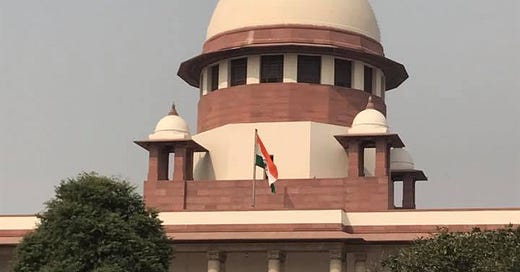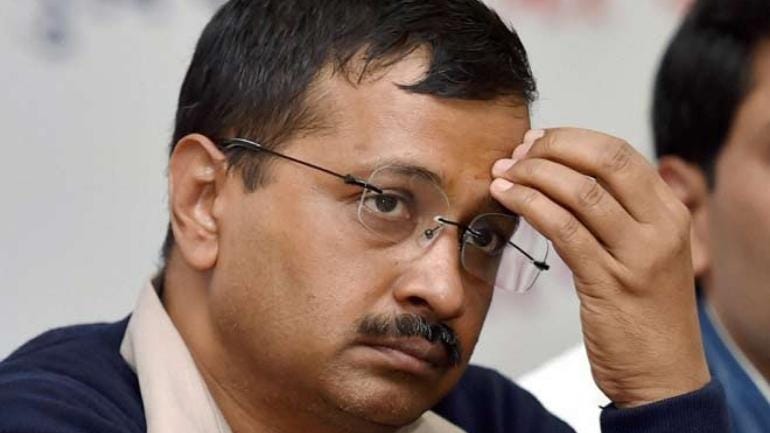Supreme Court Grants Interim Bail to Arvind Kejriwal in ED Delhi Liquor Excise Case
Stops short of declaring the arrest as illegal and refers key questions to a larger bench. Is Arvind Kejriwal required to resign from the post of CM Delhi?
Interim Bail for Kejriwal
The Supreme Court of India bench comprising Justices Sanjiv Khanna and Dipankar Datta has granted interim bail to Arvind Kejriwal in connection with the Enforcement Directorate (ED) investigation into the Delhi liquor excise case. The Apex Court's decision, delivered on 12th July 2024, highlights significant legal principles, including the principle of proportionality and the “need and necessity” of arrest by the Enforcement Directorate (ED) in money-laundering cases, referencing the Vijay Madanlal Chaudhary case. This article will delve into the details of the interim bail terms, the legal principles discussed, and the implications for future proceedings under the Prevention of Money Laundering Act, 2002, particularly concerning arrest and bail.
Terms of the Interim Bail
The Supreme Court's order for interim bail includes specific terms for Arvind Kejriwal, who had been arrested by the ED on 21st match, 2024, after he successively skipped attending multiple summons of the central probe agency:
- He shall furnish bail bonds in the sum of Rs. 50,000/- with one surety of the like amount to the satisfaction of the Jail Superintendent.
- He shall not visit the Office of the Chief Minister and the Delhi Secretariat.
- He shall not sign official files unless required and necessary for obtaining clearance/approval of the Lieutenant Governor of Delhi.
- He will not make any comments regarding his role in the present case.
- He will not interact with any of the witnesses or have access to any official files connected with the case.
“The interim bail may be extended, or recalled by the larger Bench,” the Court observed
Data on ECIRs and Arrests by the DoE
The Court noted that as per the data available on the website of the Directorate of Enforcement (DoE) as of 31st January 2023, a total of 5,906 Enforcement Case Information Reports (ECIRs) were recorded. Searches were conducted in 531 ECIRs, resulting in the issuance of 4,954 search warrants. Among these, 176 ECIRs were recorded against former Members of Parliament (MPs), Members of Legislative Assemblies (MLAs), and Members of Legislative Councils (MLCs). The number of persons arrested stands at 513, while 1,142 prosecution complaints were filed. This data raises several questions about the DoE's policy on arrests under the Prevention of Money Laundering Act (PMLA).
Applicability of Article 14
The bench conceded that the principle of parity or equality under Article 14 of the Constitution dictates that benefits or advantages given in error should not be claimed as a right by others. The doctrine of need and necessity to arrest is relevant here, indicating that the DoE should act uniformly and consistently, ensuring one rule for all (emphasis ours), as Section 45 of the PMLA gives primacy to the DoE's opinion in granting bail.
Principle of Proportionality
The principle of proportionality, especially concerning Fundamental Rights such as the right to life and liberty, played a crucial role in the Supreme Court's decision. This principle requires a balance between individual rights and public interest, ensuring that any action taken is necessary and within the range of reasonable decisions. The Supreme Court referenced several cases to emphasize the importance of proportionality in legal decisions, including:
- Chairman, All India Railway Recruitment Board v. K. Shyam Kumar
- State of Uttar Pradesh v. Lal
- Modern Dental College & Research Centre v. State of Madhya Pradesh
- K.S. Puttaswamy (Retired) and Anr. (Aadhar) v. Union of India and Anr.
- Anuradha Bhasin v. Union of India and Others
Need and Necessity of Arrest
The Supreme Court addressed the critical issue of the need and necessity of arrest under the Prevention of Money Laundering Act (PMLA). The Apex Court questioned whether mere satisfaction of formal parameters to arrest is sufficient or if a deeper examination of necessity and need to arrest is required. This inquiry includes evaluating:
- Preventing a person from committing further offences.
- Proper investigation of the offence.
- Preventing a person from disappearing or tampering with evidence.
- Preventing a person from making any inducement or threat to dissuade disclosure of facts.
- Ensuring the person's presence in court whenever required.
Arrest in Kejriwal’s Case
In the context of Arvind Kejriwal's case, the court observed that his arrest was perhaps not immediately necessary based on the material available, but stopped short of categorically declaring his arrest as illegal. Such a verdict would have had far reaching legal and political repercussions, and it appears that the Apex Court did not want to wade into a political minefield. The Bench also cited Vijay Madanlal Choudhary's decision, which held that the necessity to arrest is an additional factor beyond the conditions stipulated in Section 19(1) of the PMLA.
Reference to Larger Bench
The Supreme Court has referred the question of the "need and necessity of arrest" to a larger bench for further examination. The questions to be considered include:
(a) Whether the “need and necessity to arrest” is a separate ground to challenge the order of arrest passed in terms of Section 19(1) of the PML Act?
(b) Whether the “need and necessity to arrest” refers to the satisfaction of formal parameters to arrest and take a person into custody, or it relates to other personal grounds and reasons regarding necessity to arrest a person in the facts and circumstances of the said case?
(c) If questions (a) and (b) are answered in the affirmative, what are the parameters and facts that are to be taken into consideration by the court while examining the question of “need and necessity to arrest”?
Implications for Future Proceedings
The Supreme Court's decision does not preclude the ongoing regular bail proceedings in the Delhi High Court or lower courts, which will continue to their logical conclusion. Additionally, Arvind Kejriwal will not be immediately released as he is also under arrest in a separate CBI case. Needless to say, he would be entitled to seek bail therein, and given that the same would be governed by normal law, it is likely that he would obtain bail in the CBI case in a matter of weeks rather than months.
Should Kejriwal Resign as the Chief Minister?
In paragraph 86 on the penultimate page of the 64-page judgment, the Apex Court broached this important issue, especially in the context of the interim bail condition that he would not visit his office or the Delhi Secretariat or sign any files unless these were required to be submitted to the Lieutenant Governor of Delhi. It, however, left the matter to the wisdom of the larger bench, stating:
“We are conscious that Arvind Kejriwal is an elected leader and the Chief Minister of Delhi, a post holding importance and influence. We have also referred to the allegations. While we do not give any direction, since we are doubtful whether the court can direct an elected leader to step down or not function as the Chief Minister or as a Minister, we leave it to Arvind Kejriwal to take a call (emphasis ours). Larger Bench, if deemed appropriate, can frame question(s) and decide the conditions that can be imposed by the court in such cases.”
Scope of the Judgment
In the concluding paragraph, the Apex Court clarified that the observations made in this judgment are solely for deciding the present appeal and will not be construed as findings on the merits of the case or allegations. The facts, as alleged, still need to be established and proved. Any application for regular bail, if pending consideration or requiring a decision, shall be adjudicated based on its own merits.
Summing Up and Looking Forward
The Supreme Court's grant of interim bail to Arvind Kejriwal underscores vital legal principles, particularly the necessity for proportionality and a thorough examination of the need for arrest. Referring the matter to a larger bench for further consideration highlights the significance of these principles in future PMLA cases. As legal proceedings continue, the broader implications of this decision will likely influence the handling of similar cases.
Implication for Similar Cases
Though not directly applicable, this verdict could also impact the bail applications of Kejriwal's erstwhile cabinet colleagues, including Manish Sisodia and Satyender Jain. The legal fraternity, political parties, Kejriwal's defence team, and civil liberty organisations will be closely watching the proceedings before the larger bench, probably a 3-memeber bench or potentially even a five-member bench, which will address the questions framed in this case and possibly revisit the Vijay Madanlal Chaudhary judgment. This latter judgment by a three-judge Bench has faced strong criticism from pro-liberty NGOs.
In summary, the instant Supreme Court judgment warrants two cheers for its balanced approach and commitment to upholding fundamental legal principles. We reserve the third cheer for the verdict of the larger bench.





